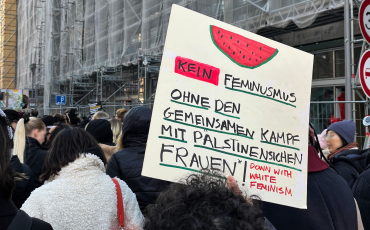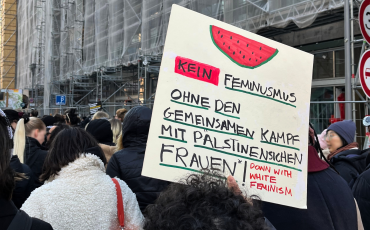The Israeli-Palestinian conflict also takes place in the arena of international law. Nadija Samour, a German-Palestinian lawyer specializing in international criminal law, writes about the role of civil society for bringing about a law-based solution.
The resort to legal measures in the case of Palestine sheds light on the law's potentials and pitfalls. While Palestinian representatives have taken several legal steps before international courts and committees, the power asymmetry between Israel as the biggest military power in the Middle East, supported by many powerful nation-states in North-America and Europe, and the Palestinians unfolds further on the international legal arena. It is in part reflected in the norms and institutions of international law, its practice and colonial legacies.
However, drawing on lessons from strategic litigation, namely aiming at structural change by using individual cases, I will address what chances these legal steps open up for popular mobilisation and civil society worldwide. After all, it's not necessarily legal technicalities that are crucial to achieve justice, but a build-up of (international) pressure, characterised by a shift of discourse and the right timing.
Taking Israel to Court? Palestine's Efforts at International Legal Fora and Bodies
A number of legal steps have been taken to confront Israeli violations against Palestinians. But what are the chances to achieve justice in international legal fora against the backdrop of global power relations?
Take for instance the inter-state complaint against Israel lodged by Palestine in April 2018 for breaches of its obligations under the International Convention on the Elimination of All Forms of Racial Discrimination (ICERD). The complaint speaks of a “litmus test” for the ICERD, as this is the very first inter-state complaint in the history of this Convention. Echoing the Committee's concluding observation in 2012 when it drew attention to “two entirely separate legal systems” and other Israeli practices that “amount to de facto segregation”, Palestine's 350-page long ICERD communication references several Israeli violations of ICERD provisions. It contends that Israel limits the freedom of movement of Palestinians compared to Israeli settlers, carries out extrajudicial punitive actions against Palestinians including land confiscations and house demolitions, and subjects the Palestinian population and the Israeli settlers to two different sets of laws.
Furthermore, the communication denounces violations of Article 3, which requires State Parties to condemn and eradicate apartheid and racial segregation “in territories under their jurisdiction”.
The potentials of this ICERD inter-state complaint are manifold: not only will it urge the ICERD Committee to form a Conciliation Commission and to facilitate negotiations in ending Israel's unlawful treatment of Palestinians. What’s more, the Committee will also urge other State Parties to the ICERD to submit supporting materials and hold Israel accountable by ensuring that it complies with the Convention. Significantly, the inter-state complaint under ICERD helps to legally re-frame the factual situation in Israel and the occupied Palestinian territories. While the vocabulary of international humanitarian law which addresses occupation and armed conflict is criticized as outdated after more than 50 years of occupation, human rights law such as in ICERD helps to address developments like annexation and siege, the international crime of apartheid, and settler-colonialist policies and laws.
No Israeli Cooperation
However, Israel has declined to cooperate with the Committee which – in light of Israel's decade-long disrespect for international law – comes as no surprise. Even though the Convention foresees that the State Party concerned “shall submit to the Committee written explanations or statements clarifying the matter and the remedy, if any, that may have been taken by that State”within three months, Israel has to date not issued anything the like. In other words, Israel has not (yet) complied with its international legal obligations.
Similarly, Israel is currently unwilling to cooperate with the International Criminal Court (ICC), notwithstanding the Prosecutor's current preliminary investigations into war crimes and crimes against humanity. The accusations of committing international crimes include Israel's expansion of settlements, pillaging and seizure of Palestinian land and natural resources, unlawful killing of civilians, torture, the crime of apartheid and persecution. With the resistance of the US and other powerful allies to ending impunity of Israeli international crimes, there is legitimate disbelief and hesitance concerning any positive outcome of possible ICC and ICERD proceedings. The legacies and colonial legal-normative frameworks in which these bodies function may be hard to break.
Mounting Pressure by Non-State Actors?
Yet, while Israel is pushing back on the ICC’s efforts, sometimes even with improper means, such as withholding tax transfers to the Palestinian Authority or threats to engage in a public campaign against the Court, the pressure to hold the Government accountable is mounting. If state actors won't comply to achieve justice, perhaps non-state actors such as businesses would? This question has been raised by the UN Human Rights Council (HRC) in mandating the UN Office of the High Commissioner of Human Rights (OHCHR) with setting up a database of businesses that operate in Israel's unlawful settlements. The HRC has been guided by the notion that “settlements are extensively altering the demographic composition of the Occupied Palestinian Territory and fundamentally threatening the Palestinians' right to self-determination. The violations of human rights associated with the settlements are pervasive and devastating, reaching every facet of Palestinian life. Owing to settlement development and infrastructure, Palestinians suffer from restrictions on freedom of religion, movement and education; their rights to land and water; access to livelihoods and their right to an adequate standard of living; their rights to family life; and many other fundamental human rights.”
A list of 206 businesses is due to be disclosed soon which may pave the way for an intensified mobilisation of civil society. With German companies being among the biggest investors in Israel's unlawful settlements, Germany, too, may turn into a frontline for civil society activities in the struggle for human rights for Palestinians. After all, if states fail (and they do in the case of Palestine!), the hope for change lies with popular mobilisation and civil society actors. Even though the list has not been published yet, warning letters have already been sent to the listed companies; a chance to rectify their wrongs through pressure to abide international law has proven to be successful in the past, too.
Adjusting the Focus: International Civil-Society Movements as the Core Drivers for International Law
These assessments show that despite serious concerns, not all steps on an international legal level are pointless. However, they need to be seen in light of an increasing role for civil society movements as trailblazers in international law. In that sense international legal moves should be seen as strategic litigation in the wider sense where law is employed to bring about structural change and enforce human rights. This means that cases are meant to overcome structures of inequality and not meant to remedy only the individual or solitary examples. In fact, these cases might well be lost before courts but can raise awareness and even as lost cases can contribute to structural changes.
For these changes to occur, strategic litigation is at its best when it is grounded in civil society movements. In fact, even pending investigations help to keep the international community's attention on unlawful Israeli acts. This attention supports efforts by civil society actors to explain in legal terms what Israel is being accused of and helps to mobilize for holding Israel accountable. Recent success stories include the Irish bill to ban settlement products, and the divestment of Airbnb from its settlement business.
International law, with all contradictions and its display of colonial power structures, has “ignited the Palestinian civic imagination”, calling for bold and creative steps. Now, the question is, how can civil society and popular mobilisation in Germany and internationally help to answer this call?
***
Many thanks to Dr. Nahed Samour and Dr. Sobhi Samour for helpful comments and a fruitful debate.




















